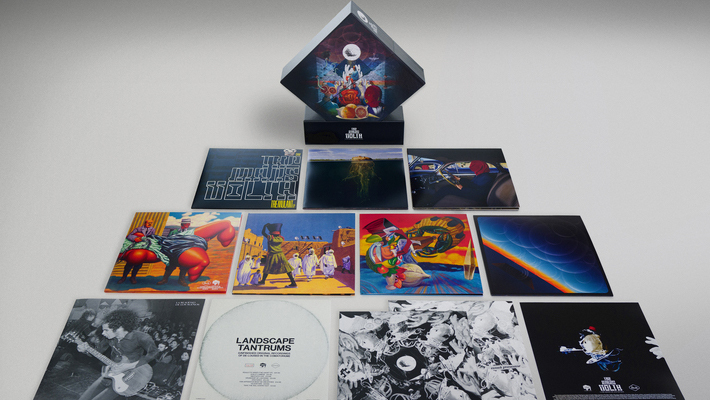
Following his death in 1992, Francis Bacon’s studio revealed dozens of destroyed paintings. The idea of those completed works hung in galleries or private homes existed in some form or fashion for Bacon, but that wasn’t enough. It wasn’t what it was meant to be. And yet, those works remained, in their mangled form. The destruction was its own act of creation, part of Bacon’s process, one that created sacred beauty out of the profane.
Recently, very much alive guitarist Omar Rodríguez-López was featured in German newspaper The Süddeutsche Zeitung along with Clouds Hill producer Johann Scheerer in advance of The Mars Volta’s massive, career-spanning box set La Realidad De Los Sueños, out today. In the interview, the two discuss the role of pain in work, among other topics. And Rodríguez-López expresses his thoughts on the physical act of creating art, or in this case, a song:
“You’re destroying all the possible ways in which it may have developed. You’re erasing all the different chords, intervals, melodies and arrangements in order to see a manifestation of your own view – which is the same as taking control of destruction and turning it into creativity. You’re cooperating with destruction. When I’m starting off with a song, I can hear hundreds of different versions and I love each and every one of them. They all make me happy. But I have to choose one that’s going to be mixed, mastered and printed.”
There’s no doubt when listening to The Mars Volta that pain and destruction form a common thread. Rodríguez-López famously spoke of trying to “wrestle the guitar” due to his combative and complex relationship with the instrument. Singer Cedric Bixler-Zavala utilizes the profane amidst the sacred in his lyrics, often tying death and decay directly to religious iconography. The pair’s musical journey has been filled with tragedy and loss since their early At The Drive-In days.
And yet, there was always creation in destruction.

That’s on full display in La Realidad De Los Sueños, an eye-opening 18-LP set featuring no shortage of surprises (including pins, 3D glasses, illustrations, and yes, that truly haunting “Mr. Muggs” song — but strangely, missing the “Frances The Mute” single). Nowhere is that motif clearer than the disc that’s (rightfully) drawing the most attention: the unfinished Deloused In The Comatorium sessions (titled Landscape Tantrums). This destroyed canvas showcases the raw, the exposed, the unsanded of the band at its earliest, still reeling from the dismantlement of At The Drive-In. Holed up in Long Beach, Calif. (at a place they dubbed Akinulapo — which translates to “he who carries death in his pouch”), the band would find its voice, one as unique as any in modern rock.
The result was the Long Beach-recorded Tremulant EP (also remastered in the box set), which gave way to the finished product of Deloused, given the appropriate amount of Rick Rubin magic that has made it as powerfully disruptive as ever since its release almost 20 years ago.
But between Tremulant and Deloused was a destruction of all the possible permutations The Mars Volta could’ve developed from. Spiritually and in some ways physically, as band members joined and left, the “train” — Bixler-Zavala’s cheeky term for the band — rolled on regardless of who was on it. That’s what makes Landscape Tantrums so intriguing, not just as a time capsule, but as a work of art. One can parse both the past and the future of Bixler-Zavala and Rodríguez-López’s work in these tracks. It’s a chance to experience those Bacon works before he would slash them to ribbons or make them unrecognizable to anyone but himself.
And in a lot of ways, this ouroboros of beginning and end in the physical act of creating a box set represents the entire ethos of The Mars Volta. By going back to the beginning, a band that ended in 2013, but always twisted and morphed — songs appearing in one form or fashion on other projects or other groups, collaborators teleporting in and out, At The Drive-In bookending both, with Antemasque (a 2014 project featuring Flea made possible by the end of The Mars Volta in the first place) and Bosnian Rainbows wedged in — could start again as an Escher painting.
Where one chooses to engage with the group is up to them, and box sets like this have power in ways streaming can’t. You’re free to dive in, but once you’re in, you’re on a staircase to nowhere. You’re in the Dark City. You’re K from The Castle.

It’s a fitting monument to a band that never purported itself to be boring or accessible. Just looking at a The Mars Volta album cover, or even just peering at a tracklisting or their song lengths, gives that away. One album is based on a cursed Ouija board that is now allegedly broken and buried. Bixler-Zavala often switches between languages, and creates his own words mid-song. Rodríguez-López presents a challenging production style to both listeners and his own musicians (who sometimes don’t know which project they’re recording their isolated tracks for). One song (in five parts) off Frances The Mute clocks in at over 32 minutes.
(All of it – from profane to sacred and from absurd to inspired – it should be noted, sounds absolutely incredible on this vinyl, and reflects the painstaking process that must have been remastering each of these recordings.)
And yet, for as silly (or “self-indulgent,” as critics loved to write as often as possible) as all of it can be, it’s also incredibly ambitious. For every musical interlude that features four minutes of coqui frogs, there’s some of the most inspired guitar work or percussion of the 2000s. For every challenging riddle or narrative in Bixler-Zavala’s lexicon, there’s inspired repeated refrains that stick with you. They’re all or nothing. They’re pain and laughter. They’re destruction and creation. And La Realidad De Los Sueños (which fittingly translates to the reality of dreams) is the beginning and the end and a new beginning (in the form of Landscape Tantrums) of The Mars Volta.
Because what is a punctuation mark if not the end of one sentence and the start of another?
0 Commentaires